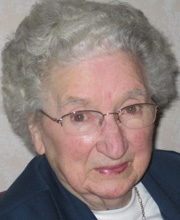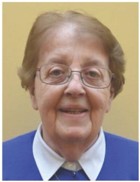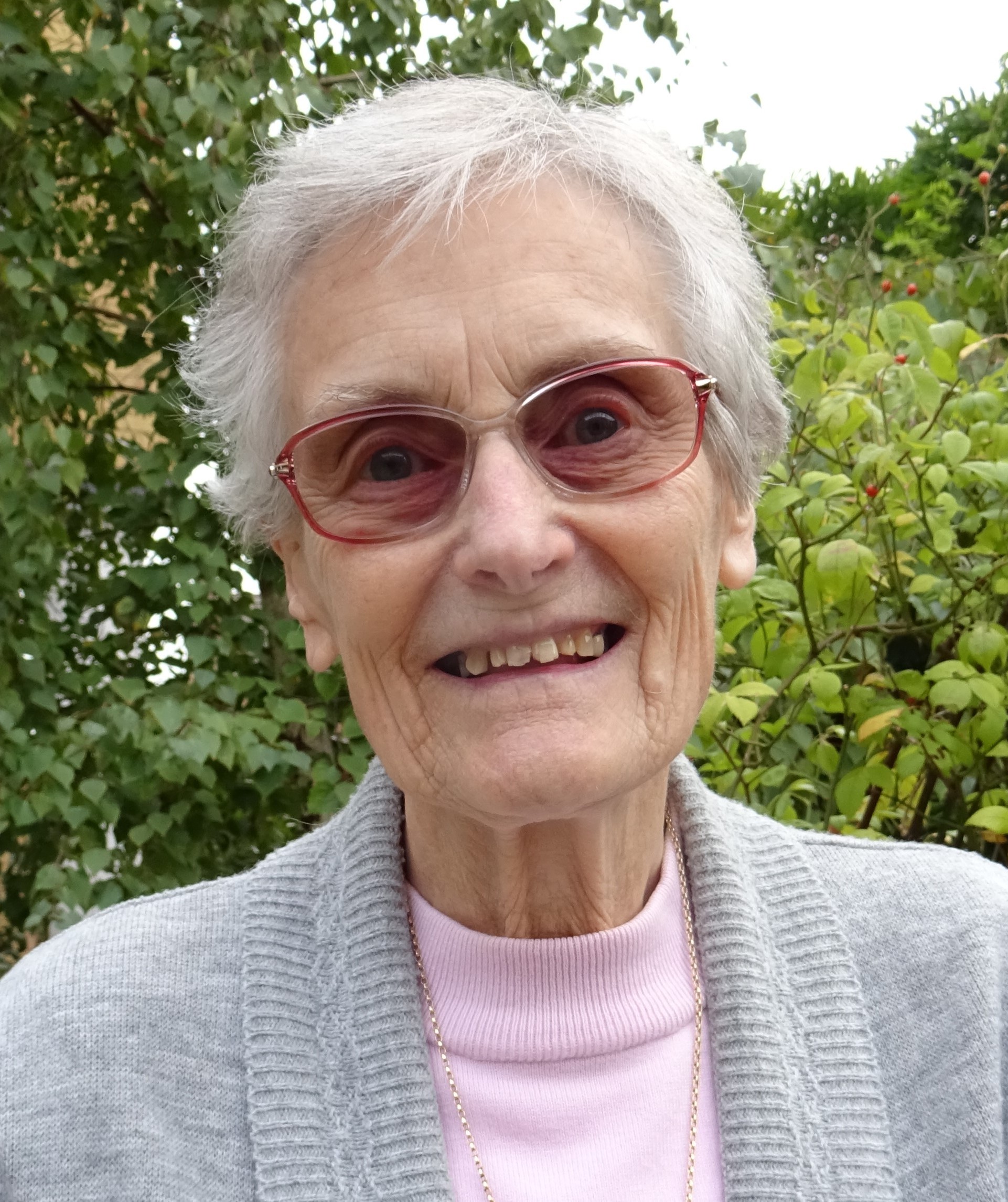
 Sister Teresa Wadding
Sister Teresa Wadding
1924 – 2013
Born: 27th June 1924
Entered Religious Life: 4th October 1949
Died: 29th March 2013
An appreciation of Sr Teresa Wadding
The homily given at Sr. Teresa’s Funeral Mass by her brother Fr. George Wadding C.Ss.R.
What a powerful promise Jesus made to us! “My Father’s will is that I lose nothing of all that he has given to me….(So,) whoever sees the Son and believes in him shall have eternal life…” And despite this promise, when a loved one dies we invariably think of death as an enemy. It brings sorrow and pain to loved ones… But death can also be seen as a friend as a door that opens into paradise, as a full stop to life’s sorrows and disappointments, as the reward that crowns life’s struggle and brings us the eternal life guaranteed us through the death and resurrection of Christ.
Good Pope John XXIII wrote in his diary: “Death is a golden step towards our fatherland, towards one’s holy friends and relatives who come to meet us, towards the embrace of the Blessed Virgin, towards the vision of God and eternal possession of him. O Happy Death! You are the gate of heaven, a birth to true life.” I have no doubt that Teresa’s leaving us on Good Friday was such a happy event. Like the good thief on the cross she heard the Lord whisper in her ear, “this day you will be with me in paradise.” And there were plenty of family and friends in paradise there to greet her.
Teresa was the fourth in a family of thirteen children. She was the longest lived of all those who died before her. To live to 88 in our family is a first class miracle in itself. Her death brings to ten the number of her siblings who have completed their earthly pilgrimage and returned to the Father.
She and Kathleen always wanted to enter religious life but postponed it until the family was sufficiently settled and cared for after our parents’ deaths. Though a child myself, I have good memories of Teresa at home – particularly, her good humour. I remember her standing before a mirror making faces at herself to get us all laughing. Her mad half-hour she used to call it. To the end of her days she loved a good laugh and her smile rarely left her. And all that despite the fact that at times she tethered on the edge of religious scruples.
Teresa (or Sr. Mary des Victoires, as she was then called) blossomed in religious life. She left school at inter-cert level but came into her own when she qualified as a social worker. She displayed those great qualities that St. Paul listed in our second reading this morning: compassion, kindness, humility, gentleness and patience.
She thrived in her work in Hoxton (near Hackney in London), and later in Bristol, then in Rock Ferry near Liverpool; and, after she was officially retired, she went to Marycrest (Los Angeles) to work for a further 14 years. Without work in her latter years she was a bit lost, but found some relief working in St. Anthony’s Guild until the ascending years eventually took their toll and she accepted the inevitable.
Let me briefly mention two qualities which I think were the hallmark of her personality: her enormous capacity for friendship with colleagues in the Congregation and with her relatives and friends even from pre-convent days. The other quality was her story-telling. Her friends among the Sisters knew more about our family than some of ourselves did. And we learned a lot about Sr. Anne Lally, Kathleen Newell and Margaret Mary and many others of yourselves…
Particularly, when she talked about cases she had encountered in her social work, her stories would digress up by-ways and down slip-roads and around detours until the main road almost disappeared in a haze of parentheses. She got used to me saying to her, “Teresa, I’m losing you; come out of the footnotes.” In a sense, in these stories Teresa was simply re-living and celebrating her own life.
After the Vatican Council, like many religious, Teresa could not get enough renewal. She attended course after course and lecture after lecture in England and America. Even after she retired the second time and returned to Ireland she attended a three-month renewal course with us in Marianella. She simply could not get enough.
She also loved shopping for a bargain, but shopping with her was a nightmare. Leave her side for one second and she vanished down the aisles of modem labyrinthine superstores. Annoying at the time, but laughable afterwards! … But these are stories for another time and another place.
Teresa loved God. She served him faithfully, especially in the poor. But the wealthy also get sick and old and need a comforting presence which Teresa provided in her years in L.A. She walked faithfully in the spirit of Mother Mary Aikenhead. And I’ve no doubt that Mary Aikenhead was head of the long, long queue of people who were waiting to welcome Teresa into her promised haven. As the first reading said: “Happy are those who die in the Lord! Happy indeed, the Spirit says, now they can rest forever after their work, since their good deeds go with them.”
It was sad to see her losing her powers at the end – not remembering people she truly cared about. But, let us think of her, not on her Good Friday Cross but on her Easter Resurrection day.
“Think (of her)
Stepping on shore, and finding it heaven;
taking hold of a hand, and finding it God’s hand;
breathing new air, and finding it celestial air;
feeling invigorated, and finding it immortality;
passing from storm and tempest to an unbroken calm;
(think of her)
waking up, and finding it home…”
where she now rests in peace with her parents, her brothers and sisters, the members of her religious family, and many, many more! So, may it be! Amen.
Sr. Joseph Helen Cunningham.
We are standing this morning on holy ground: the place where Mary Aikenhead spent the last years of her life as an invalid – a woman whose vision, courage and practical common-sense gave birth to our Congregation and to our long and graced history of service of the poor, the weak and the vulnerable. Today we are celebrating the life of Sr. Joseph Helen, a woman who cherished that charism, serving those in need with fidelity and generosity, and who also spent the last years of her life here in the Hospice.
The readings this morning are both comforting and challenging. In the Gospel Jesus speaks of himself as the Way, the Truth and the Life. He invites us to put our hope and our trust in Him and in His promise to be with us, steadily and constantly as we try each day to walk his way, to speak his truth, to live his life. It is an apt description of the life and commitment of the woman whom we are remembering here.
In her 103 years of life, Sr. Joseph Helen lived through historical and global changes that are impossible for us to imagine. She experienced seismic shifts in Church and state. She witnessed wars and famines on a world scale. Through all of those years she remained steadfastly faithful to the constant core of who she was as an RSC. She was born Dorothy Cunningham in Ballacolla in Portlaoise on 1st July 1908. She was an only girl, with one brother, and was much loved by all. Her childhood and youth reflected the calm ordinariness of children’s lives at that time. Following her degree studies she spent some months caring for her mother who was ill and then secured a job teaching in Mountjoy St. School in Dublin. Her father was not impressed! His comment on hearing of that place was: “It doesn’t sound like much of a job but you like working for the poor and you’ve always been good at it”. She remained there until she entered the Sisters of Charity on 5th October 1931.
In the first reading we are told that God gives strength to the wearied; that those who hope in Yahweh will soar like eagles, run and no grow weary, walk and never tire. That was so true of J. Helen throughout her active life. She was missioned back to Mountjoy St. after her religious profession and taught there for 12 years. Following a year’s further study in Scotland, she went to teach in a Secondary Modern school in Walthamstow in England for a year. And then came the call to be one of our three founding Sisters of the Zambian Region, or Northern Rhodesia as it then was.
In 1948 they set sail, travelling for four weeks by boat – The Athlone Castle – rail, bus and lorry before arriving in Chisekesi Siding on a dark morning on 28th October 1948. Sr. Helen kept a diary of the journey which was printed for the 50th anniversary and which gives a fascinating insight into their journey and how they coped with, what was for them, such a strange and almost ‘alien’ environment.
One can only imagine the anticipation and anxiety, the challenge and the loneliness, the wonder and the doubts that marked that journey and her first months in Zambia. It was a place and people that she came to love and cherish. She committed herself to the education of girls and brought the gift of knowledge and freedom to countless women who still remember her with gratitude and appreciation. There are many past pupils with sad hearts in Zambia at the moment – their sadness at her passing tempered only by their gratitude that she is free from the debilities of her age. And that mourning is echoed this morning among our sisters there in the Region and here in this Chapel in the sisters who lived with her and shared her life for those 30 years.
Her first 15 years in Zambia were spent in the Teacher training college run by the Jesuits and began her work in promoting the education of girls – beginning with the setting up of a girls secondary boarding school in Roma in Lusaka. Nine years later she was appointed Regional Leader and on Independence day 1978 she was conferred with the Order of Distinguished Service for 30 years of outstanding service to the people of Zambia in the fields of Education and Social work.
While she was a formidable woman in many ways, with high standards and expectations, her devotion to her religious life and her commitment to education was recognized and appreciated by all who knew her. She was a strict disciplinarian, spoke the truth without apology and demanded very high standards. At the same time her heart was compassionate and her generosity and hospitality were known and appreciated by all.
Like all of us, Helen has known suffering and joy, tears and laughter, pain and happiness, loneliness and friendship. And she had strong relationships with her friends – too numerous to mention – but exemplified in the love and devotion of Sr. Mary Bernadette Collins and Catherine Fallon. Up to the end she valued and enjoyed her relationships with her nieces, nephews and other family members and followed their lives with interest, with love and with prayer.
In 1978 she was missioned to Ireland and worked on our Constitutions. Subsequently she was appointed as local leader to our community in Crumlin before her appointment to our Provincial Leadership team and consequent arrival here in Our Lady’s Mount in 1981.
Sr. J. Helen’s commitment to Mary Aikenhead’s charism was single-minded and she never compromised on that. The second reading confirms her attitude to life: nothing outweighs the supreme advantage of knowing Christ Jesus. It is only through Him, with Him and in Him that we can find life and happiness and fulfilment. Rooted in that conviction, she endorsed and embraced anything that served the people for whom she cared in a better, more dignified or respectful way.
She suffered in her growing debility and weakness these last years and all of us – family, community, friends and colleagues – were saddened as we watched her suffering and her struggle to cope. In spite of the wonderful, caring staff who surrounded her and the sisters and friends who were her constant support, she had difficult and dispiriting days. Yet she never gave up . Her faith in Providence was the touchstone of her life. In the midst of all her pain and letting-go she was confident that he was with her, holding her, comforting her and in the end, calling her to himself. And when that call came, she yielded her spirit to the Lord, peace-filled, calm and trusting – blest with a death that had no struggle, no pain, no fear. And perhaps I can end with some words of hers, written in the diary of which I spoke, on her arrival in Chikuni: “Now that we have reached our Promised Land we must thank God and Our Lady for our very pleasant and on the whole easy journey which we have had . . . . “ Those words echo, not only the journey to Chikuni, but her life journey, now at its end as she moves, we believe, into the fullness of the Promised land of God’s life and love.

 Sister Teresa Wadding
Sister Teresa Wadding





